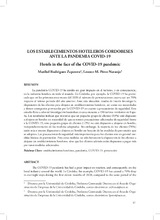Mostrar el registro sencillo del ítem
Los establecimientos hoteleros cordobeses ante la pandemia Covid-19
| dc.contributor.author | Rodríguez Zapatero, M. | |
| dc.contributor.author | Pérez Naranjo, Leonor | |
| dc.date.accessioned | 2023-05-18T12:04:39Z | |
| dc.date.available | 2023-05-18T12:04:39Z | |
| dc.date.issued | 2021 | |
| dc.identifier.isbn | 978-84-9927-601-4 | |
| dc.identifier.uri | http://hdl.handle.net/10396/25311 | |
| dc.description.abstract | La pandemia COVID-19 ha tenido un gran impacto en el turismo, y en consecuencia, en la industria hotelera en todo el mundo. En Córdoba, por ejemplo, la COVID-19 ha provocado que en los primeros once meses del 2020 el número de pernoctaciones cayera casi un 70% respecto al mismo período del año anterior. Ante esta situación, resulta de interés investigar la disposición de los clientes para alojarse en establecimientos hoteleros, así como sus necesidades y deseos emergentes provocados por la COVID-19 en cuanto a precauciones de seguridad. Este estudio lleva a cabo tal investigación basándose en una encuesta a 450 turistas residentes en España. Los resultados indican que mientras que un pequeño grupo de clientes (10%) está dispuesto a alojarse en hoteles sin necesidad de que se tomen precauciones adicionales de seguridad frente a la COVID-19, otro pequeño grupo de clientes (12%) no está dispuesto a alojarse en hoteles, independientemente de las medidas adoptadas. Sin embargo, la mayoría de los clientes (78%) están más o menos dispuestos a alojarse en hoteles en función de las medidas de prevención que se adopten. Las precauciones de seguridad más importantes para los clientes son en general medidas básicas de prevención. Pero estas medidas no sólo favorecen la disposición de los clientes a alojarse en establecimientos hoteleros, sino que los clientes además están dispuestos a pagar más por tener medidas adicionales. | es_ES |
| dc.description.abstract | The COVID-19 pandemic has had a great impact on tourism, and consequently, on the hotel industry around the world. In Córdoba, for example, COVID-19 has caused a 70% drop in overnight stays during the first eleven months of 2020, compared to the same period of the previous year. Given this situation, it is of interest to investigate the willingness of customers to stay at a hotel, as well as their emerging needs and desires caused by COVID-19 in terms of safety precautions. This study carries out such research based on a survey of 450 tourists residing in Spain. The results indicate that while a small group of customers (10%) are willing to stay at a hotel without the need for additional safety precautions against COVID-19, another small group of customers (12%) are not willing to stay at a hotel, regardless of the precautions taken. However, the majority of customers (78%) are more or less willing to stay at a hotel depending on the prevention actions that are adopted. The most important safety precautions for customers are generally basic preventive actions. However, these actions not only favor the willingness of customers to stay at a hotel, but customers are also willing to pay more for additional safety precautions. | es_ES |
| dc.format.mimetype | application/pdf | es_ES |
| dc.language.iso | spa | es_ES |
| dc.publisher | UCOPress | es_ES |
| dc.rights | https://creativecommons.org/licenses/by-nc-nd/4.0/ | es_ES |
| dc.source | Rodríguez Zapatero, M. y Pérez Naranjo, L. (2021). Los establecimientos hoteleros cordobeses ante la pandemia Covid-19. En Rivera Mateos, M. (Coord.), El turismo en Córdoba: escenarios, tendencias y perspectivas (37-50). UCOPress | es_ES |
| dc.subject | Establecimientos hoteleros | es_ES |
| dc.subject | Pandemia | es_ES |
| dc.subject | Covid-19 | es_ES |
| dc.subject | Prevención | es_ES |
| dc.subject | Hotels | es_ES |
| dc.subject | Pandemic | es_ES |
| dc.subject | Prevention | es_ES |
| dc.title | Los establecimientos hoteleros cordobeses ante la pandemia Covid-19 | es_ES |
| dc.title.alternative | Hotels in the face of the COVID-19 pandemic | es_ES |
| dc.type | info:eu-repo/semantics/bookPart | es_ES |
| dc.rights.accessRights | info:eu-repo/semantics/openAccess | es_ES |

